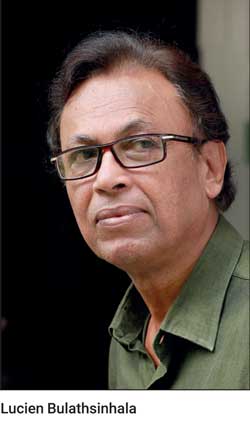Sunday Feb 15, 2026
Sunday Feb 15, 2026
Saturday, 20 May 2023 00:08 - - {{hitsCtrl.values.hits}}
 By Helasingha Bandara
By Helasingha Bandara
Had he been born in England, Lucien Bulathsinhala could have been the poet laureate of his time. Undoubtedly, he could have been included in the company of John Keats, Robert Frost, and William Wordsworth. I have not met him personally, nor have I ever seen his acting or his stage plays, but I have listened to his songs. To understand his real worth, a person should know the Singhalese language and culture, have an acute sense of appreciation, and have experience of an underprivileged life in Sri Lanka.
Sadly, he was born in Sri Lanka to a family that could not afford what a child in his innocence would fantasise of possessing. As an adult he was not encouraged but mostly discouraged by a cruel, hypocritical, and barbarically jealous society that a budding great was left to wither without reaching the peak of his enormous capabilities that would have taken him beyond the shores of Sri Lanka to achieve international recognition.
Instead of the first lines of his signature song Raja Meduraka Ipadi Sitiyanam, Numbath Rajeki Puthune (Had you been born in a palace you could have been a king), I chose to sing in his praise, “Had he been born in England he could have been a poet laureate.” There is a plethora of literary evidence in his work to support my claim. Although he has written this song with his own experience, for Malini Bulathsinhala, only an extraordinary lyricist can compose a song of that calibre. He has transferred his own feelings as a child into his mother’s thoughts in such a magnificent manner that the song could have had universal appeal, had the idea been written in English.
As a response to the statement, had you been born in a palace you could have been a king, the imaginative writer says that the drizzle or the dew is coming through the wind-blown reed-roof to your regal bed, instead of saying but you were born poor. mqxÑ meálalka uÕ os. y~jk is,a,r ri leú,s¡¡ ÿj hk b.s,,k úis;=re fi,a,ï hdkd fmkS fmkS¡¡ wyl n,df.k u. os. hk úg kE ug jdjkAfka¡¡ When the mother says she cannot bear the pain that is caused by the boy’s pretentious indifference to the roadside vendors who sell sweetmeats and toys, no one can listen to the song without a big lump in their throat.
Among many songs written in praise of mothers, Raja Meduraka could be the most striking in expressing the internal agony of a mother and a son. As an adult Lucien has imagined the excruciating pain his mother has gone through being unable to give what the child would have treasured at that age. Lucien has magnified the common pain that many parents experience with his creative thoughts, and the penetrative vocabulary to be sharper than a dagger going through a person’s heart.
Every time I hear this everlasting song, I cannot help visualising cute little Lucien walking in front of his mother pretending not to notice the attractions around that some of the other boys could enjoy. I cannot but weep, weep for Lucien, weep for me and weep for thousands of other little children. While it is difficult to choose from the list of songs Lucien has written as they beat each other in their quality, for the purpose of this essay, I chose to name a few to highlight his imagination, word choice and musicality. They are Ahasin Tharuwak Kada Wetenawa, Dangakari Man Madduma Doni, Kolom Thota Netha Mahaluwee and Pipunu Male Ruwa Emala Danido.
Only recently I realised that two people can develop similar thoughts on a topic when I heard Lucien’s Pun Poda Sanda Numba Gena Awoth. I had listened to the song earlier, but the real meaning must have escaped me. This time it struck me like lightning compelling me to think about the meaning. mqka fmdaod i`o Tn f.k wdfjd;a u,a jÜáhlg wr.kakï Tn yeuodu;a b,a,k ;reu,a Tng fk<d ms<.kajkakï If you bring me the full moon, I’d turn it into a flower tray The stars that you crave for every day, I’d pluck and put in it to give you foaÿkakla Tn ug f.k wdfjd;a úis;=re i`tjla úhñ thska mri;= Whfka ilauka lrkg bka ieriS Tn yd tkakï If you bring the rainbow to me, I’d knit a shawl from it. To wear to walk in the park with you.
People always dream about unattainable fantasies. Neither Lucien nor I am an exception to that truth. Without knowing that Lucien had written this song many years before me, some time ago, I wrote a poem that depicts similar sentiments. In my appreciation, love, and honour for Lucien, thus I dedicate my poem to him. Long live dear Lucien!
To My Love
Stars aren’t nigh
I can’t jump that high
If I could
I’d pluck them to make a
garland for you
The Milky Way is far away
I have no wings to sway
If I had
I‘d snatch it to make a
shawl for you
A butterfly of varying hue
To turn to gold is due
If I could
I’d turn him to gold to be a
broach for you
Golden domes and silver bells
Heaven, they say
with beauty swells
If I could
I’d take you to heaven to live
I hope you understand
My love for you knows no bound
Yet
I am no wind, nor cloud
Just a man on the ground
To you my beautiful love
Heaven and earth I cannot give
As long as I live
Be assured of my eternal love